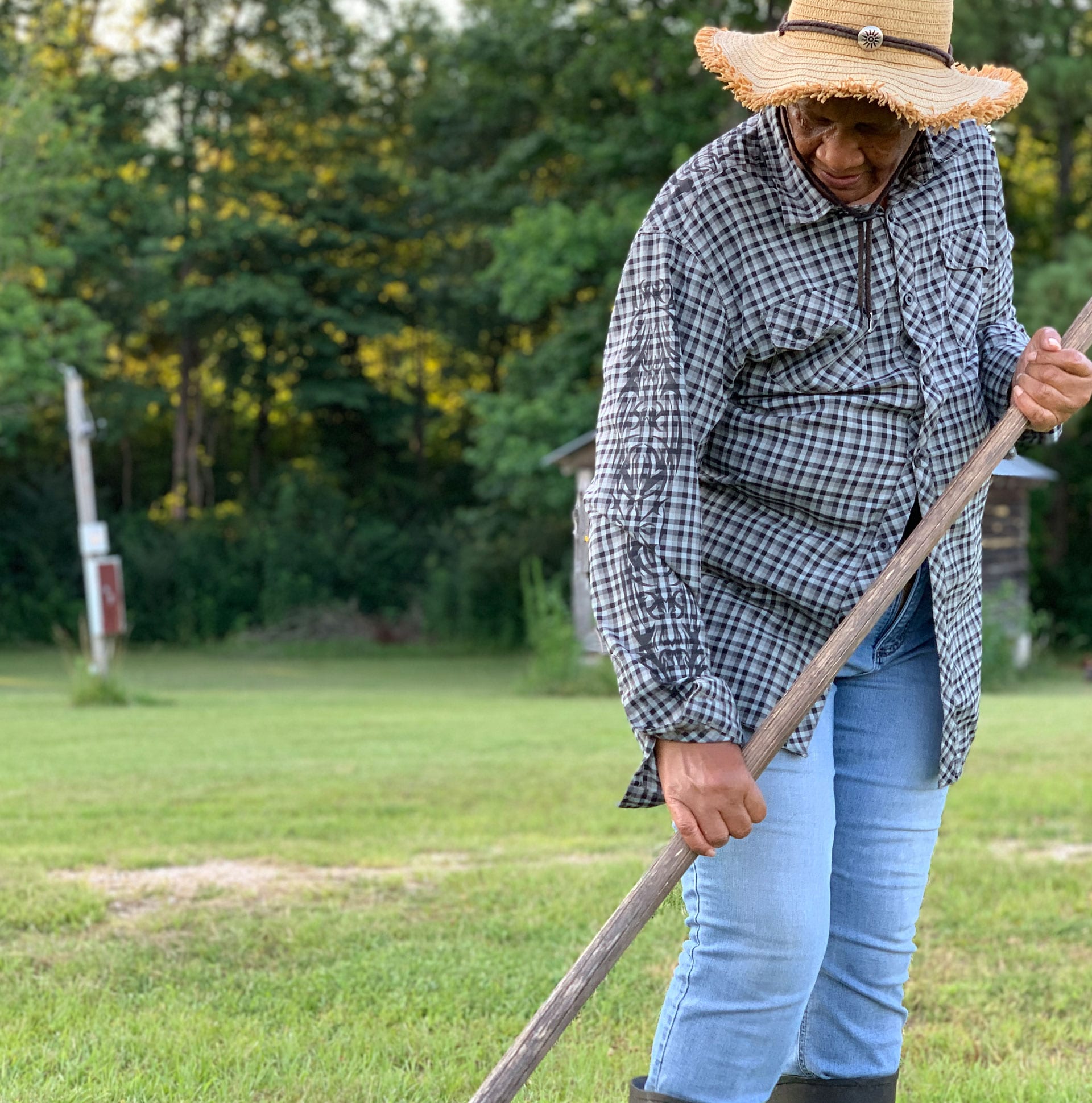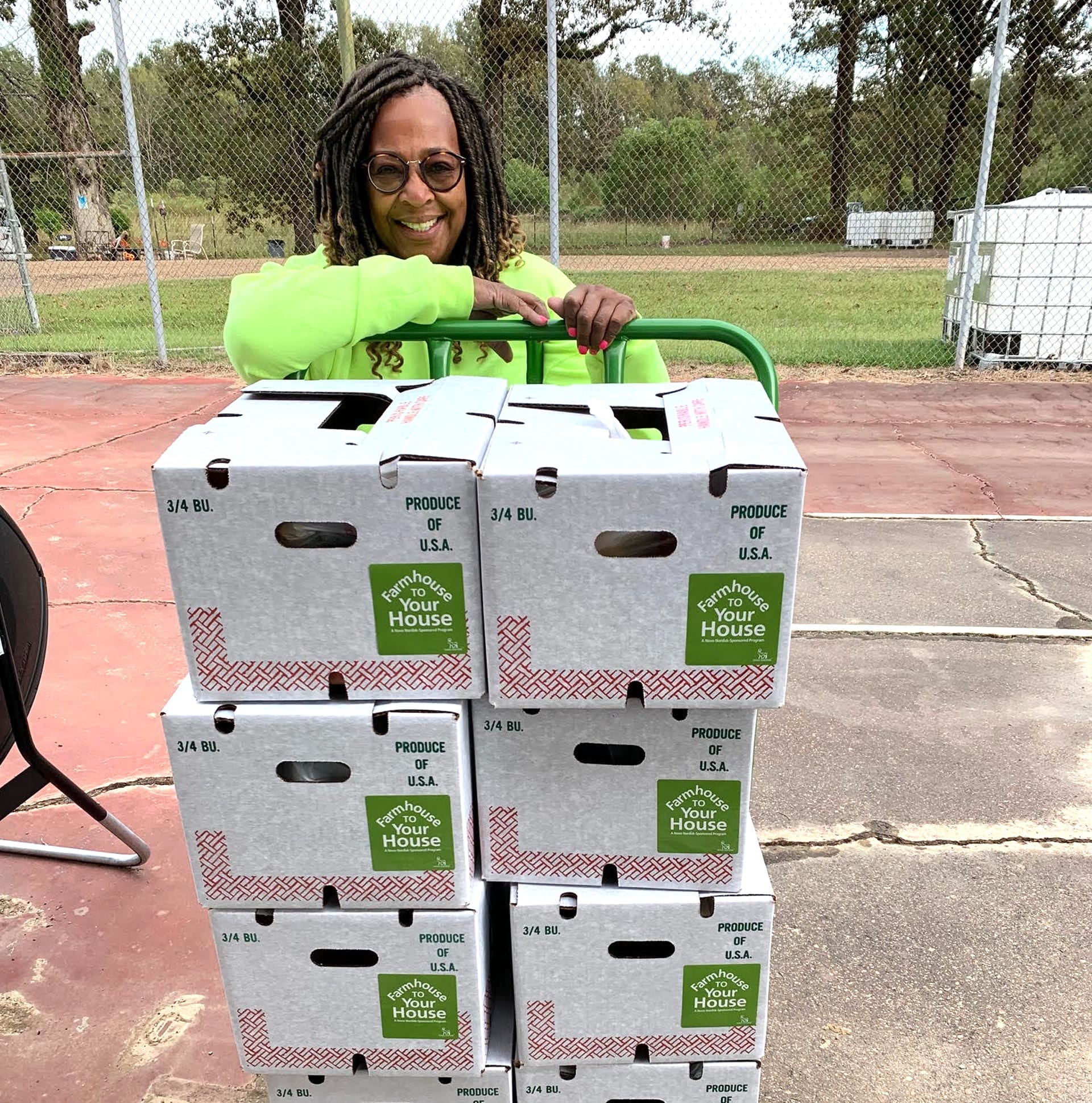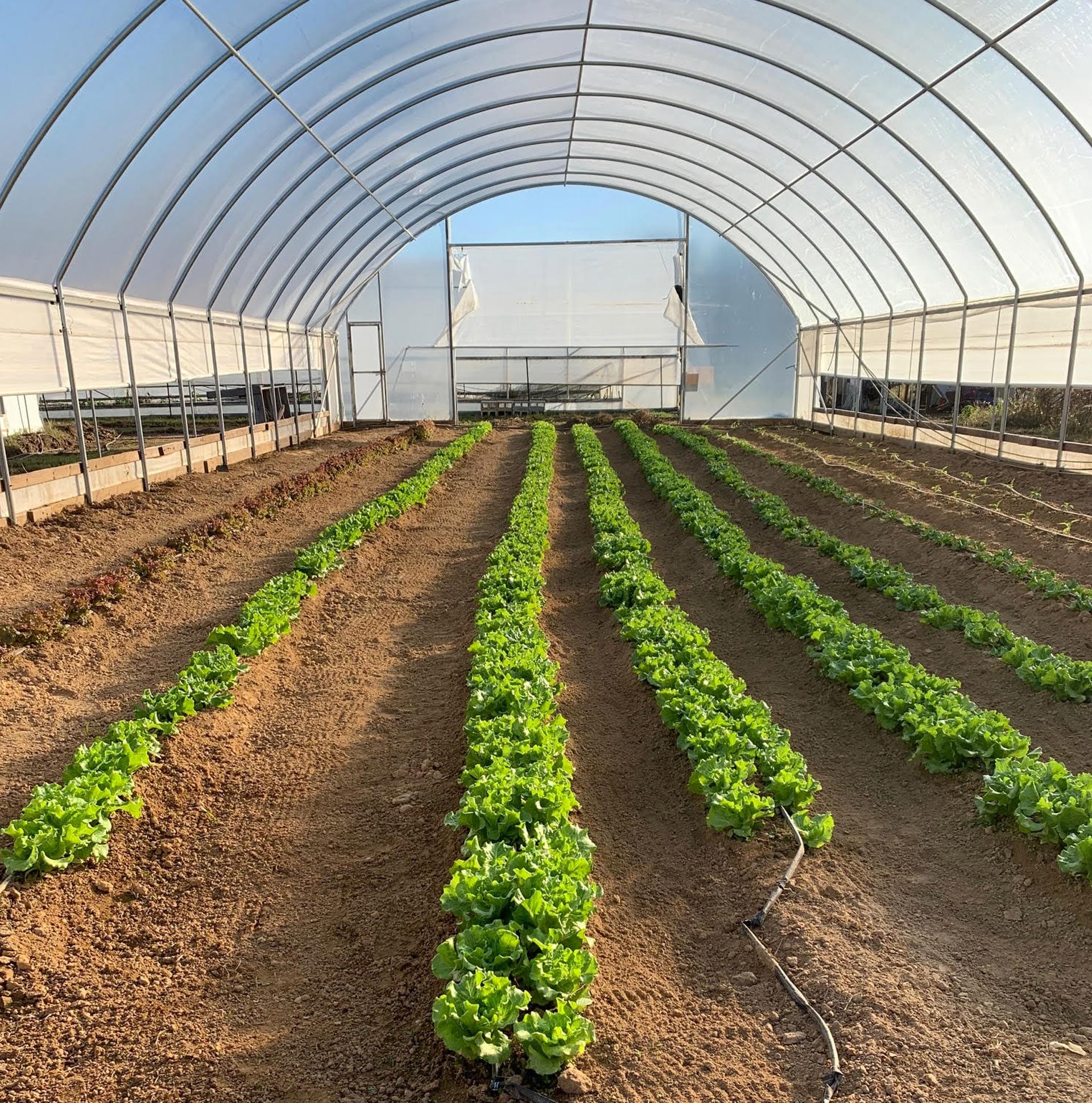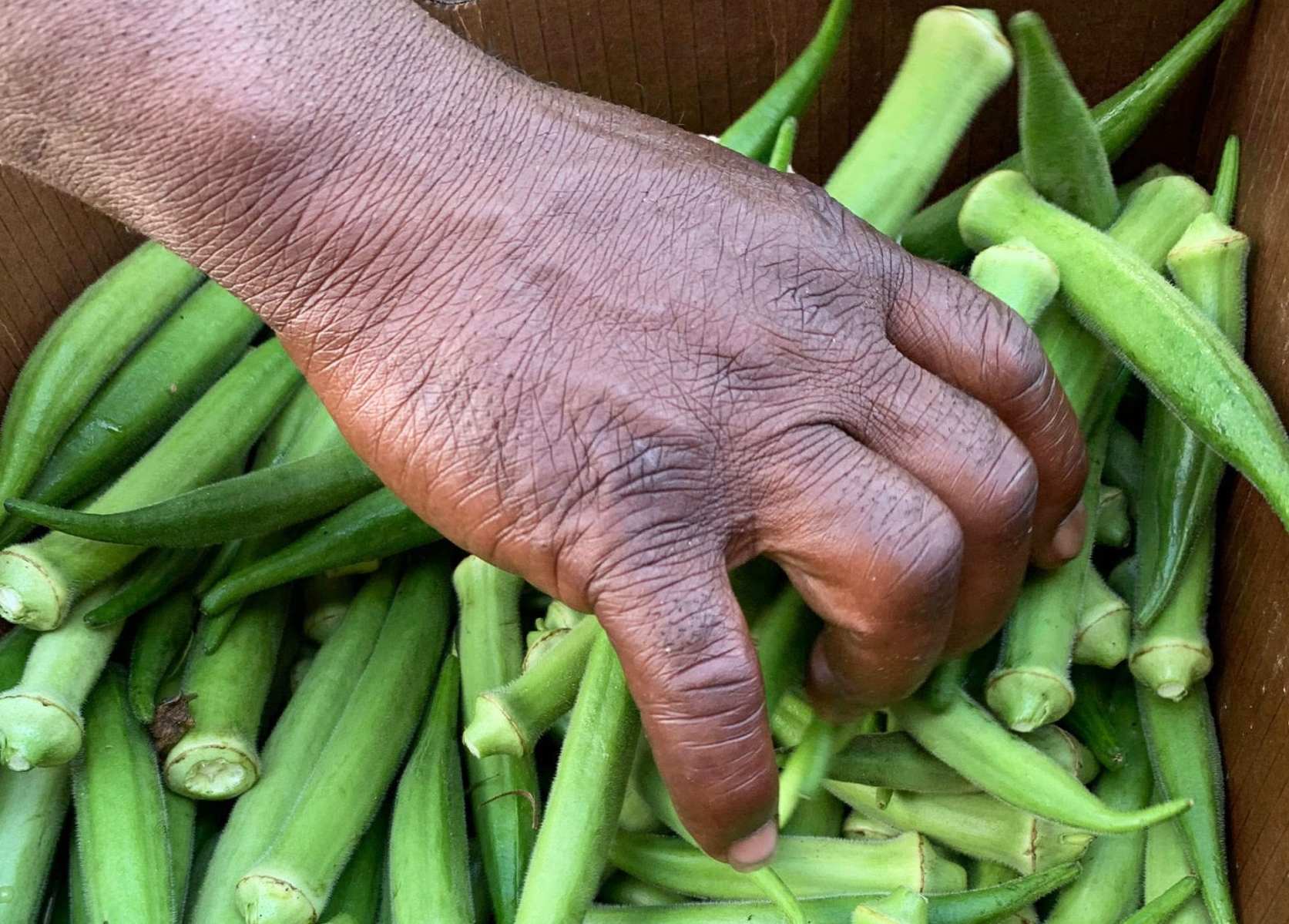This story was published in partnership with Southerly, a nonprofit, independent media organization that covers ecology, justice, and culture in the American South.
Nettie Parker grew up craning her neck. Downwards, hunched over endless rows of prickly white fluff. Upwards, tilted to witness the majesty of a Mississippi night sky unmitigated by cityscape.
On a muggy day this spring, Nettie and I stood in her garden in Philadelphia, Mississippi, a small city in the eastern part of the state, around 100 miles from Jackson. “When you wish upon a star,” she sang, recalling what she and her seven siblings longed for after spending their days laboring. “I wish I was rich. I wish I was in the city. I wish I had a car. I wish. I wish. I wish.”
Nettie, 78, is my much-older cousin who fulfilled a lifelong dream of returning to Mississippi when she bought an acre of land up the driveway from my parents. She decided she would come home after her husband died a decade ago. Growing up, Nettie’s family sharecropped under a Black family in the Longdale community of Philadelphia. Nettie and the other kids on the land gamified grinding chores. Nettie bagged 100 pounds of cotton by dinner, fixed the meal, then went back to the field, or brought the cows around so they could be milked first thing in the morning.
“That would be child abuse today if we did that,” she said. “But you did what you had to do.”
Much about life in Longdale was about musts, not wants, including why Nettie left. Nettie’s family never wanted to leave Mississippi — they had to.
On a typical evening while they were porch-sitting in the late 1940s, according to Nettie’s estimation, a truck turned off the highway and into the family’s yard. A group of white men with guns got out and stood waiting for Nettie’s father, John Riley, who was in the house sick and resting on a cot. Nettie’s dad had borrowed some money from a White man and never repaid him. A neighbor talked the White men into leaving, perhaps fronting them some money, Nettie recalled.
“Next thing I know, Ko, my daddy had left and went to St. Louis,” Nettie told me. “They came to kill him that night. He would’ve been lynched.”
Five years later, when Nettie was about 12, her mom, Lela Riley, packed the family up to join John. Nettie stayed away from Mississippi the next six decades. After high school, she followed one of her sisters to Detroit, married a pastor, and had five stairstep kids. She worked at a credit union for 25 years.
Life up north was hectic, and Nettie was always homesick for Mississippi. With little personal time, she found peace only when she jammed herself into the closet, closed the door and screamed. So she took up gardening as an outlet.
“That was my time alone. Nobody bothered me,” she said. “It was my space for me.” It was a way for her to reclaim time and energy, both of which she borrowed out frequently in her roles as a pastor’s wife, a mother, and a banker.
Her flowers bloomed as she lost siblings to cancer, later waging a fight of her own. She harvested collard greens as her hometown grieved the Freedom Summer 1964 murders of three civil rights workers, James Chaney, Andrew Goodman and Michael Schwerner. Her onions sprouted as the 2008 recession gutted Detroit. She came home to her city garden on bad days at the majority-white credit union. “I’d go out there and name my plants after the employees,” she told me. “If they gave me a rough day, I’d go home and cut the head off the cabbage and eat them.”

Nettie and I started gardening together not long after I moved in with my folks this spring to help with groceries and chores during the coronavirus pandemic. One evening, standing in the yard near dusk — the mosquito hour — I asked her how gardening and working the land could bring her so much joy when her introduction to such tasks was not born from a labor of love.
She told me gardening and church bring her a similar solace — where she can find quiet and “fully lose herself.” These days, when she’s not thinning greens, she passes hours on our family’s orange riding mower, which she’s coined her “Prayermobile.”
This year, Nettie’s garden is about more than peace — she’s living more off the land, too. And she’s not alone: Farmers, activists and city planners nationwide are also pivoting in light of the pandemic’s impact on food access. But in places like Mississippi, and the Deep South at large, where it is the hardest to access healthy food, reviving a connection to the land also requires restoring rituals made fraught by chattel slavery and its scions.
“It’s just something about digging in the earth, being close to nature, it just energizes me,” Nettie said while hoeing weeds that sprouted around her crepe myrtle. “I look out at the rainbow, the clouds in the sky, the blue. I just look at the trees, Ko … God’s handiwork … It’s about the land, nature, and how you can see God.”
The coronavirus pandemic has reshaped Nettie’s routine. She attends pentecostal church services via conference call, and every time she goes to the grocery store, the rising cost of meats and other staple foods floors her — if the products she needs are available at all. The early days of the pandemic upended the food-supply chain. Meat plants closed following outbreaks among workers. Other food producers slowly adjusted, leaving shelves barren for weeks on end. Meat costs more, and many grocers put limits on milk, eggs and other staples. Fruit and vegetable seeds have surged in price and are hard to come by, people are panic-buying chicks to get eggs, and many households have shifted to gardening to feed their families for less.
Food insecurity impacts large swaths of this nation: 37 million Americans live without guaranteed access to adequate food, one in seven of them children. Wage and wealth gaps impact food access, too. According to a 2018 USDA study, single-mother households experience more than double the national average for food insecurity, and about 14 percent of women living alone, compared to 12.5 percent of men living alone, experience food insecurity. The food insecurity rate for Black families is about 21 percent, nearly double the national average; Latino households are at about 16 percent.
Mississippi is the most food-insecure state in the country. Nearly one in five Mississippi households lack access to enough food, according to the non-profit Feeding America. It’s a particularly painful irony in rural swaths of the state, where people live surrounded by rolling farmland but remain shut out of nutritional food sources because of poverty and displacement. As folks like my cousin Nettie left or were forced out of Mississippi, Black farmers lost 800,000 acres of Mississippi farmland from 1950 to 1964. Black people were disproportionately denied federal farm loans, sending them into foreclosure, and wealthy White people swooped in or tax assessors out priced Black landowners into tax sales. Then there was the unmitigated violence: “lynchings, police brutality, and other forms of intimidation,” Vann Newkirk wrote for The Atlantic in 2019.
Civil rights leader Fannie Lou Hamer knew that political power would come via economic power through land ownership. In the late 1960s, Hamer bought 40 acres of farmland in Sunflower County and founded the Freedom Farm Cooperative, a farming cooperative and rural economic development project that gave Black farmers in the Mississippi Delta an opportunity to grow and sell food without the snaring sharecropping system.
“All the qualifications you have to have to become a part of the co-op is you have to be poor,” she said in a speech at the University of Wisconsin–Madison in January 1971. “We’re going to feed not only the Black people of Sunflower County, but all the people that’s hungry, regardless of color.”
The cooperative expanded to 680 acres by 1970, and with sponsorship from the National Council of Negro Women, produced thousands of pigs over a few years to feed families in need. The collective collapsed in 1975 due to a lack of funding, two years before Hamer died at age 59.
Hamer could not overcome the systemic financial disenfranchisement that locks so many Black people out of land ownership, despite having toiled on it for centuries. As Leah Penniman wrote in her 2018 book, “Farming While Black,” hundreds of years of enslavement overshadowed a “noble, autonomous farming history” and devastated sacred connections to land.
“Many of us have confused the terror our ancestors experienced on land with the land herself, naming her the oppressor and running toward paved streets without looking back,” Penniman wrote. “We do not stoop, sweat, harvest or even get dirty because we imagine that would revert us to bondage.”
Restoring a sense of rootedness in the land will require a pruning process, of sorts. A couple of years ago, farmer Cindy Ayers Elliot, 63, recommended I read “Farming While Black,” which describes a “returning generation” of agrarian people trying to “reconcile” with the land in pursuit of freedom and healing. A generation encompassing both Elliot and Nettie’s dreams.
“I always wanted to come back home,” Nettie told me. The woman she used to sharecrop for said she could build a house on the land, but wouldn’t sell her anything. It took Nettie decades to work up the nerve and find someone who would sell her a single acre of land. “I just wanted my own spot,” she told me through a laugh. “I always wanted to own my own place here.”
Elliot, a former Wall Street investment banker, likes to say that 10 years ago she traded in a pair of high heels for overalls and work boots so she could run the 68-acre Footprint Farms in Jackson. It has pasture land for animals, a lake for fish, irrigation, and recreation, 10 acres and high tunnel greenhouses for year-round vegetable production, and gathering places for agro-tourism and community events.

In between picking up a new van to deliver produce across the state and a cooking demonstration at the farm in honor of the late poet Margaret Walker’s birthday, Elliott talked to me about the legacy of women and farming. She recounted a passage from Penniman’s book, about the tradition of West African mothers weaving seeds into braids under the looming threat of being stolen — separated from their families and the land — to illustrate the legacy of how much the land meant to our ancestors.
Elliot wants her farmwork to restore relationships with the land for people like Nettie. “Us as Black people, the relationship with the soil, bringing our seeds and our concepts to these Americas to be able to eat, it wasn’t just our labor, free labor, they stole: It was also our identity of our food that our bodies were thriving on,” she told me.
During the pandemic, Footprint’s mission has become even more urgent. More than two-thirds of Jackson is a food desert. It has only 20 grocery stores, but over 70 fast-food restaurants, also making it a food swamp — an area where an abundance of fast-food, junk food, convenience stores and liquor stores outnumber healthy food options. Families can spend up to $600 a year in taxes at Mississippi grocery stores because Mississippi is one of only three states without a tax break on groceries. A petition to convince the state legislature to eliminate the tax has garnered over 1,200 signatures.
The USDA categorizes food deserts as census tracts that are both low-income and experiencing low access to grocery stores due to barriers like a lack of reliable transportation. The types of stores in an area matter, too: Accessibility to healthy food is a defining characteristic of a food desert, factoring in the distance to a store with healthy food or the number of such stores in an area. Approximately 17.3 million people live in low-income and low-access tracts and are between 1 mile or 20 miles from a supermarket. Over 2 million households without a vehicle are considered far from a supermarket, many of them are in the Deep South. Dollar stores, which are concentrated in communities of less than 20,000, are often the only grocer in many rural communities.
To drain the food swamp it’s located in, Footprint delivers “farm boxes,” a subscription-based service that gets customers affordable produce: 7 pounds for $15, or 15 pounds for $30. Elliot also partnered with Jackson Public Schools to distribute boxes of fresh produce to families in need — 450 boxes of fresh produce each week since the beginning of April. With Jackson’s schools going fully remote for the first semester, Elliot says Footprint is in conversation about chipping in to continue to help students.
Her work is part of a larger movement in Jackson to rethink how food systems in cities are designed. A coalition of activists, city planners and urban farmers have come together in Mississippi’s capital city under the umbrella of a multifaceted project called Fertile Ground. The public art project, funded by Bloomberg Philanthropies, brings together media, art, food education and farming with the hopes of healing connections with working on the land.

“It goes back to our ancestry, our connections with the soil and being able to use it to grow healthy foods,” Elliot said.
Urban designers Salam Rida, 31, and Travis Crabtree, 27, have been working to expand this work for Jackson Mayor Chokwe Antar Lumumba’s planning department in response to climate change, urban sprawl and now the pandemic. They’re currently building the EcoShed, an industrial building — white, to refract the Mississippi heat — slated to open in the fall that will be used for co-working, community building and farming. It will house a grocery store stocked with produce grown at an on-site microfarm, offering opportunities for Jacksonians to learn about farming and self-sufficiency and regenerative farming, which rebuilds soil, improves land health and works to reverse climate change.
Crabtree’s and Rida’s larger goal is to create more direct food sources and look at the impact of climate change effects, like when intense rainfall caused historic flooding in Jackson in February. The couple, who came to Jackson by way of Detroit, tends to build off one another’s points when they talk. They both lamented that the pandemic, for the time being, will prevent gatherings at the EcoShed, but say the project will be a place to facilitate conversations about food access, canning and farming — as well as independence, progress and resilience.
“What we’ve seen with the pandemic, now more people realize that the food system itself is broken,” Rida said. “When those food systems started to fail… that affected a lot of people in terms of food access and also psychologically.”
Crabtree said this work is “doomsday prepping,” in a way. “But we’re sort of at that point in history where we have an abundance of a lot of things and we keep growing and growing and growing, and the amount of inequity in the world paired with climate change is causing mass migration and other things.”
The stars Nettie sang to granted many of her wishes — her car, her city life — though she’ll make sure you know she was never rich. “I’m poor, but I’m proud,” she told herself when she left her job at the credit union. She wonders what would have happened if she never left Mississippi, or had returned sooner like some of her siblings. “Sometimes I think we would’ve done better if we had stayed here,” she told me. “Education-wise I think I would’ve graduated from college.”
I wonder, too.
Nettie’s wealth of knowledge, of survival, shows up in the way she loves this land. The way she pats the dirt, slices away tangled weeds, sells her perfectly salted garden greens on the side of the road every third Saturday. In this way, so many of our elders are rich, and by the same token, the racism that made her dad a refugee and forced Nettie’s family from their homeland makes America ever-poorer.
She echoes often, through a wide grin, that moving home has been the best decision of her life. She marvels over owning the acre of land she lives on, which produces seemingly endless garbage bags filled with collard greens — four overflowing during our last check-in — and plump watermelons too gorging for her to tote herself.
As we gardened together these past few months, dirt lodging itself under our fingernails, Nettie instructed me, laughing at me for being too city, too disconnected from the work and the land. I hope — even wish on the first stars that emerge at dusk — more of us grow, replant roots on these fertile grounds that have witnessed it all.
“I believe I’m where I’m supposed to be and I’m happy,” she told me over the phone. “I had asked God to let my last days be my best days. I’m content, I’m not stressed, I enjoy nature. I just wanted to come home to my roots.”
Recommended for you
From the Collection






